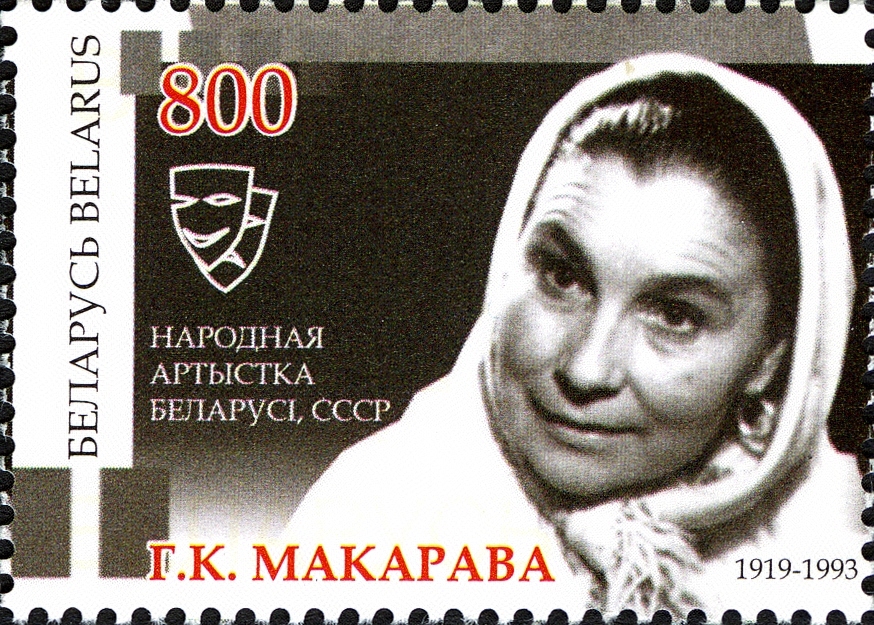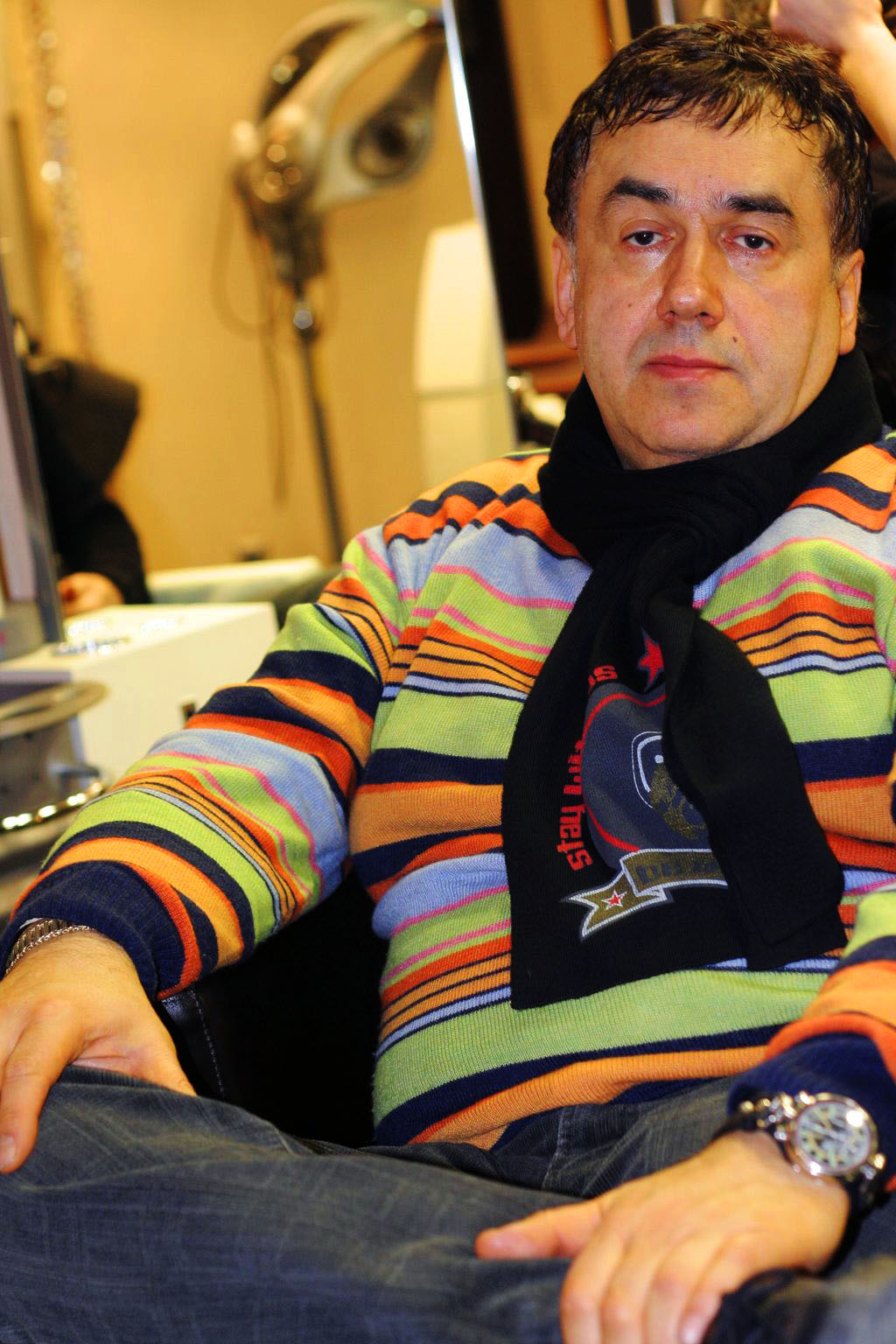|
White Dew (film)
''White Dew'' (russian: Белые росы, Belye rosy) is a Soviet 1983 comedy film directed by Igor Dobrolyubov. It was chosen as comedy of the year by Soviet Screen. Plot A small Belarusian village White Dew is becoming absorbed into a big town. In it lives an honored and respected man Fedos Khodas (Vsevolod Sanaev). He has long been a widower, and his three sons have grown up. Fedos is worried about them. Senior Andrew (Gennady Garbuk) is a solid man but too calculating. Merry Vaska ( Nikolai Karachentsov) may lose his family because his wife Marousia ( Galina Polskikh) was meeting with her ex-lover in his absence. Middle one – Sasha (Michael Kakshonav), went to the Kuril Islands, and for 15 years was not at home. Events unfold in the background concerning the village characters and their resettlement in the city apartments. Cast Lead roles * Vsevolod Sanayev – Fedos Hodas * Nikolai Karachentsov – Vasiliy (Vaska), the youngest son *Mikhail Kokshenov ... [...More Info...] [...Related Items...] OR: [Wikipedia] [Google] [Baidu] |
Vsevolod Sanayev
Vsevolod Vasilyevich Sanayev (Все′волод Васи′льевич Сана′ев; 25 2, o.s.February 1912 in Tula, Russian Empire – 27 January 1996 in Moscow, Russia) was a Soviet film and stage actor popular in the 1960s–1970s. Sanayev, a Moscow Art Theatre (and later Mossovet Theatre) actor, was honored in 1969 with the People's Artist of the USSR title; among his other accolades are the Order of Lenin (1971) and the Order of the October Revolution (1981). Biography Vsevolod Sanayev was born on 25 February 1912 in Tula. In 1926 — 1930 he worked as a bayan technician at the Tula factory of musical instruments. After a short stint at a local theatre, in 1931 he was invited to join the Tula-based Gorky Theatre of Drama and Comedy and soon enrolled in the Russian Institute of Theatre Arts. After the graduation in 1937 he joined the Moscow Art Theatre troupe. In 1938, he debuted on screen in the film ''Volga-Volga'' (where he had two minor roles), and in 1940 enjoyed ... [...More Info...] [...Related Items...] OR: [Wikipedia] [Google] [Baidu] |
Natalya Khorokhorina
Natalya Nikolaevna Khorokhorina (russian: Ната́лья Николаевна Хорохо́рина; Kharakhorina (russian: Харахорина); born in 1954) is a Soviet and Russian film and stage actress. Biography Natalya Nikolaevna Khorokhorina was born May 5, 1954, at the farm near the village of Moscow Vnukovo in Moscow region in a working-class family. As a schoolgirl, Natasha attended drama school at the Pioneers Palace. After high school, Natalya spent a year on self-education and additional documents filed immediately and Boris Shchukin Theatre Institute, and Mikhail Shchepkin Higher Theatre School. She was accepted into both. She chose the Shchepkin School, and graduated in 1976, course of Viktor Korshunov. After graduation from the school, Natalia worked in the theaters Moscow Chamber Troupe, The Ark, Sphere. Natalia Khorokhorina also played at the Moscow Mayakovsky Theatre. In the Moscow theater Sphere, Horohorina served eleven years. Her acting debut in ... [...More Info...] [...Related Items...] OR: [Wikipedia] [Google] [Baidu] |
1983 Films
The year 1983 saw both the official beginning of the Internet and the first mobile cellular telephone call. Events January * January 1 – The migration of the ARPANET to TCP/IP is officially completed (this is considered to be the beginning of the true Internet). * January 24 – Twenty-five members of the Red Brigades are sentenced to life imprisonment for the 1978 murder of Italian politician Aldo Moro. * January 25 ** High-ranking Nazi war criminal Klaus Barbie is arrested in Bolivia. ** IRAS is launched from Vandenberg AFB, to conduct the world's first all-sky infrared survey from space. February * February 2 – Giovanni Vigliotto goes on trial on charges of polygamy involving 105 women. * February 3 – Prime Minister of Australia Malcolm Fraser is granted a double dissolution of both houses of parliament, for elections on March 5, 1983. As Fraser is being granted the dissolution, Bill Hayden resigns as leader of the Australian Labor Party, and in the subsequen ... [...More Info...] [...Related Items...] OR: [Wikipedia] [Google] [Baidu] |
Belarusfilm Films
Belarusfilm ( be, Беларусьфільм) is the main film studio of Belarus. History Belarusfilm, under the name ''Belgoskino'' was founded in 1924. In 1928, the ''Soviet Belarus'' studio (''Савецкая Беларусь'') was founded in Leningrad. The studio was moved to Minsk in 1939. Film production was interrupted by World War II, and restarted in 1946, when the studio assumed its current name. In Soviet times, the studio was dubbed ''Partizanfilm'', due to the large output of films portraying the Soviet partisan's struggle against Nazi occupation. The studio was, however, also renowned for its children's films. The studio has to date made 131 animated films. Its first project was a coproduction with Soyuzmultfilm in 1963; a stop motion feature film called ''Attention! The Magician is in the City!''''Hatred''* 1930br>''Sasha''* 1933 '' The Return of Nathan Becker'' * 1933br>''The First Platoon''* 1934 '' Lieutenant Kijie'' * 1936 '' Late for a Date'' * 1936 ''S ... [...More Info...] [...Related Items...] OR: [Wikipedia] [Google] [Baidu] |
1983 Comedy Films
The year 1983 saw both the official beginning of the Internet and the first mobile cellular telephone call. Events January * January 1 – The migration of the ARPANET to TCP/IP is officially completed (this is considered to be the beginning of the true Internet). * January 24 – Twenty-five members of the Red Brigades are sentenced to life imprisonment for the 1978 murder of Italian politician Aldo Moro. * January 25 ** High-ranking Nazi war criminal Klaus Barbie is arrested in Bolivia. ** IRAS is launched from Vandenberg AFB, to conduct the world's first all-sky infrared survey from space. February * February 2 – Giovanni Vigliotto goes on trial on charges of polygamy involving 105 women. * February 3 – Prime Minister of Australia Malcolm Fraser is granted a double dissolution of both houses of parliament, for elections on March 5, 1983. As Fraser is being granted the dissolution, Bill Hayden resigns as leader of the Australian Labor Party, and in the subsequent lea ... [...More Info...] [...Related Items...] OR: [Wikipedia] [Google] [Baidu] |
Belarusian Comedy Films
Belarusian may refer to: * Something of, or related to Belarus * Belarusians, people from Belarus, or of Belarusian descent * A citizen of Belarus, see Demographics of Belarus * Belarusian language * Belarusian culture * Belarusian cuisine * Byelorussian Soviet Socialist Republic See also * * Belorussky (other) {{disambig Language and nationality disambiguation pages ... [...More Info...] [...Related Items...] OR: [Wikipedia] [Google] [Baidu] |
Galina Makarova
Galina Klimentevna Makarova (real name Agatha; be, Галіна Кліменцьеўна Макарава, russian: Галина Климентьевна Мака́рова; December 27, 1919 — September 28, 1993) was a Soviet and Belarusian stage and film actress. People's Artist of the USSR (1980). She was born in the Starobin village (now Salihorsk District, Minsk Region, Belarus). The first success on the stage came to her in 1954. She began to play in movies in 1958. Her first star role in film was the role of Aleksandra Matveyevna Gromova in the film ''Widows'' in 1976. Galina Makarova died on September 28, 1993, at her dacha near Minsk (other sources say she died in Moscow). She was buried in Minsk on the Vostochnoye Cemetery. Filmography * 1965 — ''Alpine Ballad'' as Pelageya * 1966 — '' East Corridor'' as woman behind table (uncredited) * 1976 — ''Widows'' as Aleksandra Matveyevna Gromova * 1978 — ''Young Wife'' as grandma Agasha * 1983 — '' White Dew ... [...More Info...] [...Related Items...] OR: [Wikipedia] [Google] [Baidu] |
Stefaniya Stanyuta
Stefanija Michajłaŭna Staniuta ( be , Стэфанія Міхайлаўна Станюта; 30 April 1905 – 6 November 2000) was a Belarus–Soviet theater and movie actress. She was awarded as the 1988 People's Artist of the USSR. Stefanija was born on April 30, 1905, in Minsk in the family of the famous Belarusian artist Michaś Staniuta. As a child, she happened to attend the official meeting of Tsar Nicholas II with the Belarusian people. She studied at the parish school, then at the Minsk Women's Government Gymnasium. In 1926 she graduated from the Belarusan Drama Studio under the Moscow Art Theater (class of Valentin Smyshliayev and Sofia Giatsyntova). Since 1932 and until the end of her life Stefanija Staniuta worked at the Janka Kupala National Academic Theatre in Minsk. In total she played about 200 roles, including in movies from 1958 onward. Selected filmography * 1958 – ''Red Leaves'' as episode * 1964 – ''Letters to the Living'' as episode * 1966 – ... [...More Info...] [...Related Items...] OR: [Wikipedia] [Google] [Baidu] |
Stanislav Sadalsky
Stanislav Yurievich Sadalsky (russian: Станисла́в Ю́рьевич Сада́льский; born 8 August 1951 in Chuvashia) is a Soviet and Russian actor. Selected filmography * ''The Twelve Chairs'' (Двенадцать стульев, 1971) as ''Fireman in the theater "Columbus"'' * ''The Meeting Place Cannot Be Changed'' (Место встречи изменить нельзя, 1979) as ''Kostya "Kirpich" Saprykin, pickpocket'' * ''Say a Word for the Poor Hussar'' (1981) as ''cornet Alexei Pletnev'' * ''Station for Two'' (Вокзал для двоих, 1982) as ''man with a carburetor'' * '' White Dew'' (Белые Росы, 1983) as Mikhail Kisel * ''Confrontation'' (Противостояние, 1985) as ''Gennady Zipkin, taxi driver'' * '' The Lady with the parrot'' (Дама с попугаем, 1988) as ''Gennady Fedorov'' * ''Presumption of Innocence'' (Презумпция невиновности, 1988) as ''Leonid Borisovich Ozeran'' * ''Two arrows. Stone A ... [...More Info...] [...Related Items...] OR: [Wikipedia] [Google] [Baidu] |
Galina Polskikh
Galina Polskikh (Гали́на Алекса́ндровна По́льских, born 27 November 1939) is a Soviet film actress. She has appeared in more than 100 films since 1962. In 1979 she was awarded the title of People's Artist of Russia, and in 1999 - Order of Honour (fourth degree). Polskikh became famous after playing lead roles in such Soviet films as ''Walking the Streets of Moscow'' (1962), '' The Journalist'' (1967) and ''Expectations'' (1966). Acting career Polskikh was born in Moscow in a poor family. Her father was killed during World War II, and her mother died of typhoid fever several years later. The 8-year-old girl was taken to an orphan asylum where she spent several months before her grandmother, who worked as a janitor, took her to her place. They lived in abject poverty in a small room in a basement floor of a many-storied building. To become a film actress was a cherished dream of a young girl since it was the only chance to tear herself away from desti ... [...More Info...] [...Related Items...] OR: [Wikipedia] [Google] [Baidu] |
Nikolai Karachentsov
Nikolai Petrovich Karachentsov (russian: Николай Петрович Караченцов, 27 October 1944 – 26 October 2018) was a Soviet and Russian film and stage actor of Lenkom Theatre. Karachentsov's popularity peaked in the late 1970s and early 1980s among the Soviet youth after he had starred in rock operas. In 1989 he was awarded the title of People's Artist of the RSFSR. In 2003 he received the State Prize of the Russian Federation. He was also awarded the Order of Honour and Order "For Merit to the Fatherland", 4th class. Biography Early life Nikolai Karachentsov was born in Moscow on 27 October 1944. His father, Pyotr Yakovlevich Karachentsov (1907–1998), worked for many years in the magazine ''Ogoniok'' as a graphic artist, he received the title of Meritorious Artist of the RSFSR in 1967. Nikolai's mother, Yanina Brunak (1913–1992), was a choreographer. She directed plays in major musical theaters, took part in staging performances at the Bolshoi Theatre, ... [...More Info...] [...Related Items...] OR: [Wikipedia] [Google] [Baidu] |
Vsevolod Sanaev
Vsevolod Vasilyevich Sanayev (Все′волод Васи′льевич Сана′ев; 25 2, o.s.February 1912 in Tula, Russian Empire – 27 January 1996 in Moscow, Russia) was a Soviet film and stage actor popular in the 1960s–1970s. Sanayev, a Moscow Art Theatre (and later Mossovet Theatre) actor, was honored in 1969 with the People's Artist of the USSR title; among his other accolades are the Order of Lenin (1971) and the Order of the October Revolution (1981). Biography Vsevolod Sanayev was born on 25 February 1912 in Tula. In 1926 — 1930 he worked as a bayan technician at the Tula factory of musical instruments. After a short stint at a local theatre, in 1931 he was invited to join the Tula-based Gorky Theatre of Drama and Comedy and soon enrolled in the Russian Institute of Theatre Arts. After the graduation in 1937 he joined the Moscow Art Theatre troupe. In 1938, he debuted on screen in the film ''Volga-Volga'' (where he had two minor roles), and in 1940 enjoyed ... [...More Info...] [...Related Items...] OR: [Wikipedia] [Google] [Baidu] |




